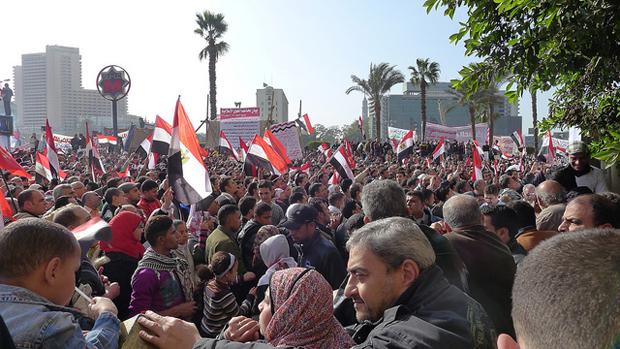Egyptian Activists Try To Counter Media Image
Tahrir Square, Jan 25, 2012 (Photo: Ed Webb/Flickr)
Tens of thousands of Egyptians rallied and marched this week to mark the first anniversary of their uprising.
The demonstrations were largely peaceful. But pro-democracy activists complain that the Egyptian military keeps violating the human rights of protesters.
And that puts them on a collision course with supporters of the military.
After dark, in a dusty cul-de-sac in a ramshackle section of Cairo’s Heliopolis neighborhood, several young Egyptian men are staging a show. They’ve rigged a laptop to a precarious tower of old speakers; and they’re projecting a film onto a 3-by-3-foot screen.
Called “Kazeboon,” the film is a compilation of video clips that show Egyptian security forces chasing, beating and shooting at protesters during clashes in November and December.
Those clips are interspersed with news footage of generals from Egypt’s ruling Supreme Council of the Armed Forces, or SCAF. The generals deny that any abuse has taken place; they stress that the armed forces have exercised self-restraint. With its grainy footage and melodramatic soundtrack, the video is neither slick nor subtle, but that’s not the point.
“We organized this event to show people who didn’t go to Tahrir Square what is happening, and to make them aware of crimes the SCAF has committed,” said 22-year-old Ahmed Khalil.
Khalil, a computer science student, helped organize tonight’s viewing and said he is happy with the turnout. But in such a densely populated area, when Cairo’s famed nightlife is just hitting its stride, it would seem that 150 young men isn’t much of a crowd.
“Most of the people who live in this neighborhood aren’t interested in coming here,” Khalil said. “They prefer to stay at home because they believe that SCAF will secure the country. So even this number of people is a positive sign.”
Then, almost as if Khalil predicted it, the street behind us filled with young men chanting in support of Egypt’s ruling military council.
The activists and the pro-military youth faced off with competing chants.
The activists shouted, “Down with the military regime.”
Their rivals yelled, “the army and the people are one hand.”
Cars and buses stopped in the street while passengers gawked; and pedestrians whipped out their cell phones to take pictures. Then, after a few shoves, the youths separated.
The incident in Heliopolis illustrates how divided Egyptians are as they mark the one-year anniversary of the start of Egypt’s revolution.
The “Askar Kazeboon,” or “Military Liars,” campaign is an attempt by activists to win more people to their view that little has changed since the revolution that overthrew long-time dictator Hosni Mubarak. SCAF forces, they say, are just as brutal as Mubarak’s were.
The most recent clashes took place in mid-December and made an icon of a young Egyptian woman who was filmed being violently kicked by black-clad riot troops while lying prone, her black veil or niqab pulled up to expose her bra.
“At that point we decided enough is enough and we have to start a campaign of truth showing people what really happens on the street, altering their major media capability by going to the street with the truth,” said Ramy Shaath, general coordinator of the Free Egyptians Group which is helping coordinate some Kazeboon viewings.
Shaath said they are trying to counter Egypt’s powerful state media machine, which owns television and radio stations and newspapers. State media routinely carries the statements of the Egyptian generals — without any balance — who paint pro-democracy activists as thugs.
Egyptians who can’t afford satellite dishes, Shaath said, are entirely dependent upon state media to help form their opinions.
But is the Askar Kazeboon campaign convincing anyone? Or, is it only attracting angry young men who already view the military council as the enemy?
“I have seen the shocking effect on people. I have seen people shocked,” Shaath said. “They were not believing what they were watching and started relating the lies they heard on state TV to the reality they are watching and started remember the kind of lies they used to hate from the Mubarak regime.”
And so on Wednesday, when tens of thousands of Egyptians poured into Tahrir Square, it was with a sense of trepidation. At the day’s end, Egypt’s health ministry said around 150 people were mildly injured — but not by security forces.
Most were accidentally crushed by the large celebratory crowds in the square. Riot police and troops didn’t have the opportunity to clash with protesters. They were conspicuously absent from the celebrations.
Every day, reporters and producers at The World are hard at work bringing you human-centered news from across the globe. But we can’t do it without you. We need your support to ensure we can continue this work for another year.
Make a gift today, and you’ll help us unlock a matching gift of $67,000!
